TOP DOG
The KZN restaurant that beat the Cape
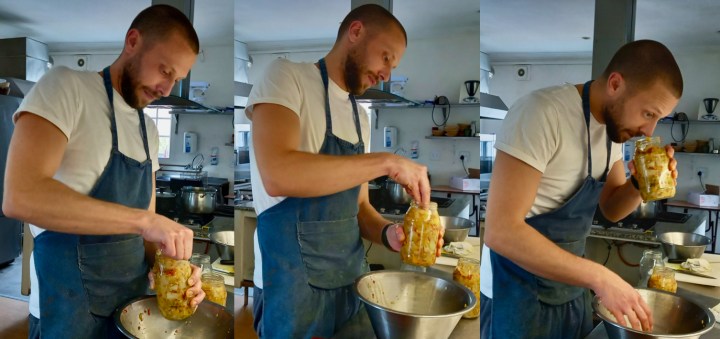
Everyone in the SA foodie world is talking about The LivingRoom at Summerhill Guest Estate in Pinetown, KwaZulu-Natal, which beat every restaurant in the country to take top honours at the 2022 Eat Out awards last week. Wanda Hennig met chef Johannes Richter to chat about the venue and their way with food.
Food. Security. Love. They manifest in oodles at this establishment. And no one was in a bad mood in the kitchen during TGIFood’s visit. Part of what flavours the food? Sweet, sour, salty. Heritage. Respect.
“When we started, people thought we were crazy,” said chef Johannes Richter when we chatted for our original TGIFood story in July 2021. “They said Durban people hadn’t travelled enough to appreciate what we wanted to do. That they don’t want to spend money on food.”
That they wouldn’t go for a chef’s choice tasting menu that changes, in some measure great or small, by the day.
On top of this there was the practical element. If you deem “location, location, location” as key to success for a dining establishment, wasn’t it crazy to open in an out-the-way residential neighbourhood with no foot traffic? Where a crowned eagle is more likely to swoop in and carry off one of your laying hens than for a would-be diner to find you.
Of course none of this was taking into account the attributes of said location. That being where it is means there is space for a bountiful vegetable and a generous herb garden.
And place for the hens, some with eccentric habits. Like she who lays one egg every two days in the laundry room. And she who likes a cuddle. Clever hens all, given that the current brood of survivors have learned to run to their hock or the kitchen to hide when the crowned eagles soar.
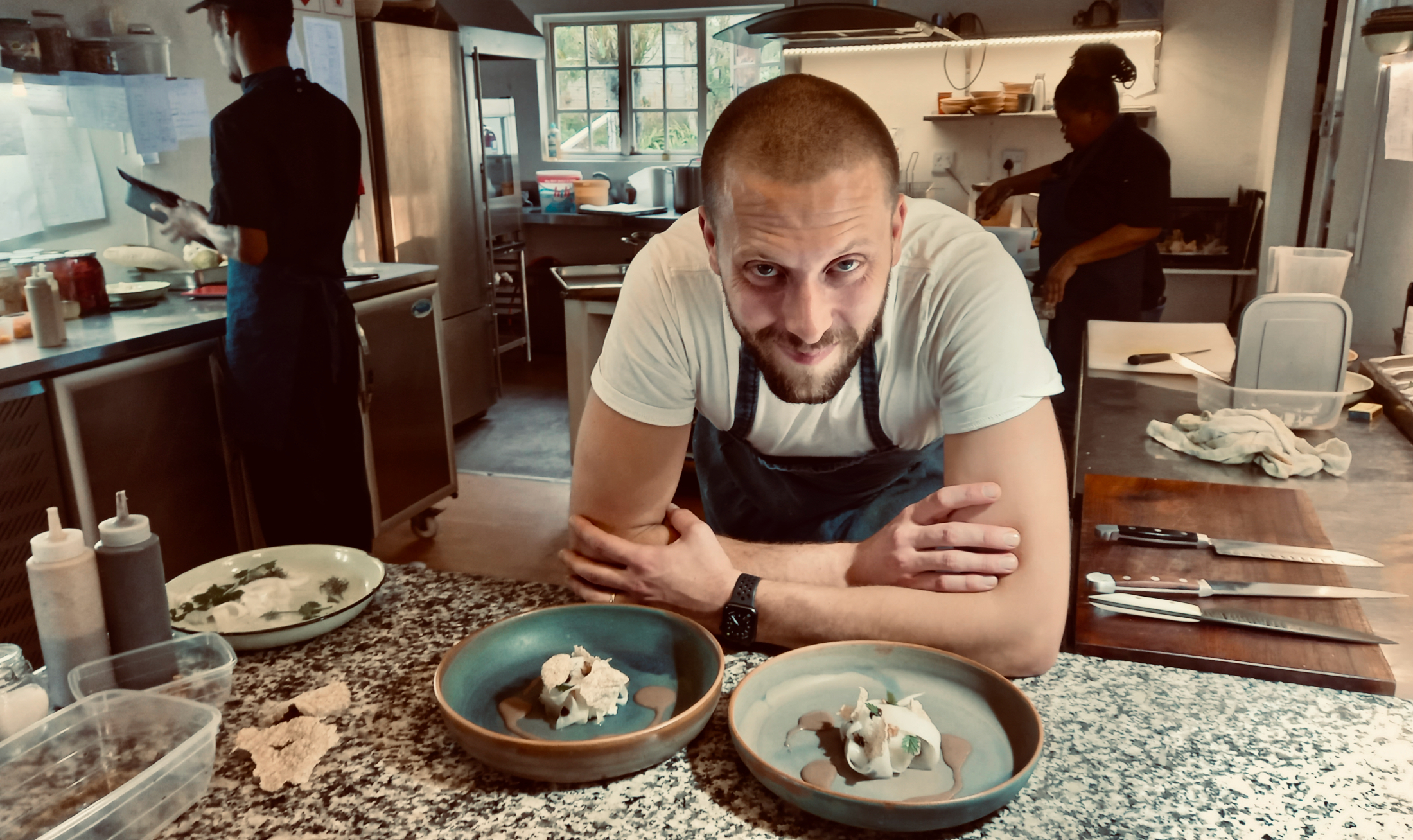
Johannes Richter and a Belnori goat cheese starter on bespoke plates made from KZN clay. (Photo: Wanda Hennig)
It wasn’t taking into account, either, the fact that the vision – to open a supper club, which you would call The LivingRoom, in what had been your family’s living room growing up – was that of a chef with a three-year “classic French apprenticeship” at a Michelin 1-star family-run hotel restaurant near the border of Germany and France. Where the focus was regional specialities. Where the owner-chef was a family friend who would mentor said chef in the kitchen while he simultaneously, by correspondence, did his three-year German hospitality guild training, for which he got the fifth-highest grade, that year, among all the students – many not working in kitchens but studying full-time – completing the degree.
A chef who then, after interning in kitchens in Germany and Italy, spent four years in the kitchen at Michelin 3-star Weinbar Rutz in Berlin, working with Chef Marco Müller, known for his product-focused modern German food, “well-balanced, creative combinations of top-quality ingredients, skillfully showcasing particular flavours”, to quote from the Michelin guide. As near as dammit to what “our” chef was thinking, planning, wanting to do.
This followed by almost two years at Michelin 1-star Bandol sur mer, “probably the smallest restaurant with a star in Berlin”, to quote from their website. An old kebab stand turned into a gourmet restaurant: seven tables, two seatings, serving French-based dishes with Japanese modern interpretation. Also produce-focused: close relationships with vegetable and fruit growers, hunters and fishermen.
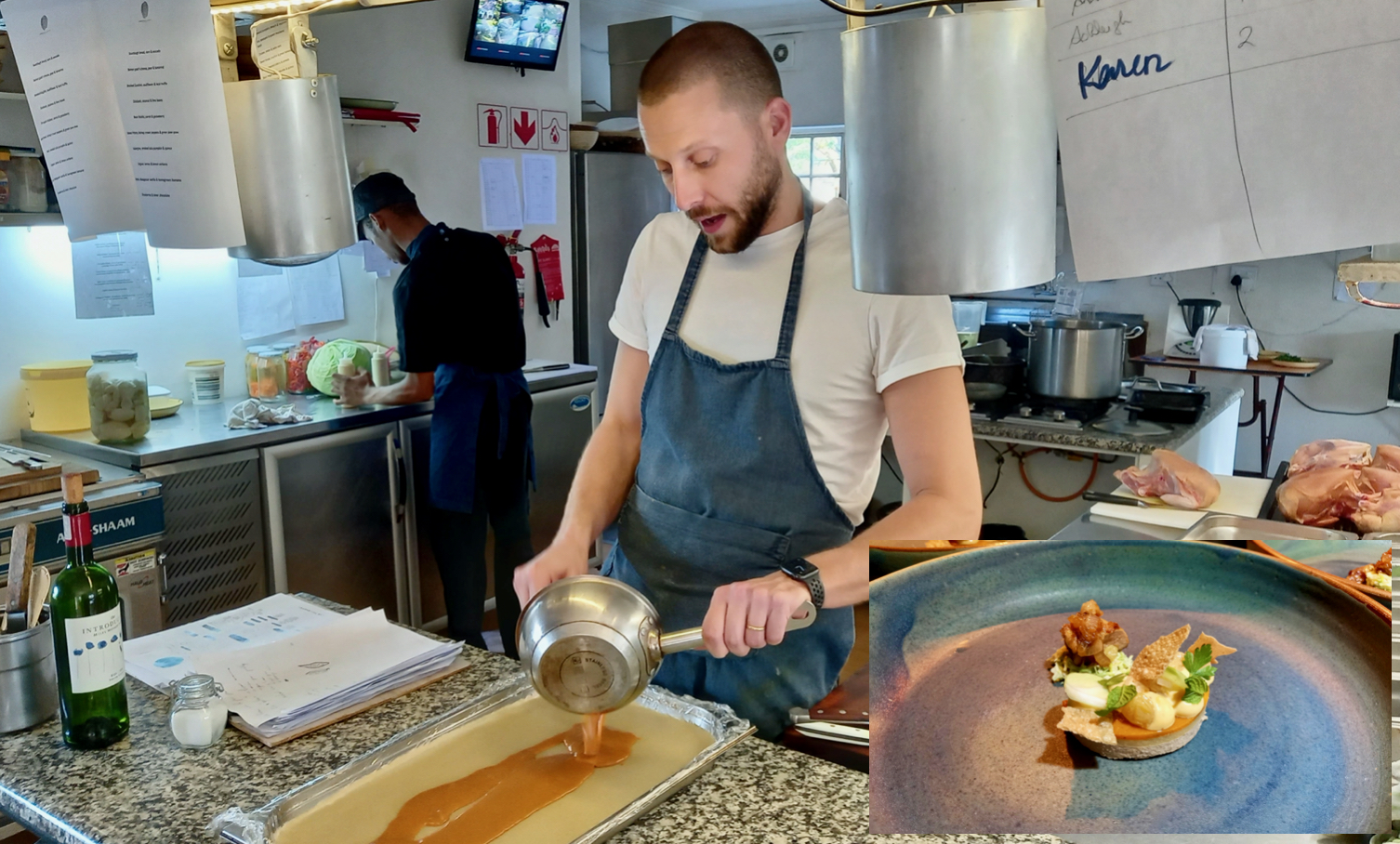
Johannes Richter spreads peri-peri jelly over onion puree over duck liver mousse. Inset: As served with a duck liver side. (Photo: Wanda Hennig)
It was in Berlin that Chef Johannes Richter, while working in the kitchen at Weinbar Rutz (the 3-Michelin star) met his wife, Johanna, a waitress there at the time.
“We got here (here being the suburban family-owned estate with a boutique hotel in Cowies Hill where he grew up) four years ago, the beginning of 2017, with a bunch of great ideas.”
They didn’t listen to the naysayers, choosing instead to “bank on Durban with its different cultures and food diversity”.
The couple had lived in Berlin Mitte, the central most-happening part of the city. “We had no kids so Berlin was at our disposal. A heady time and the perfect place to be, it opened our eyes and mindset. Informed me. Respect and tolerance. Live and let live,” he says, expressing Berlin’s appeal in a shorthand of appreciated memes.
That was before the “private motive” to return to home and hearth kicked in. Born in Germany, when he was a kid his parents had relocated the family to Cowies Hill, Durban’s outdoor climate being the big draw. “Johanna and I wanted to start a family. I had my upbringing here. Durban has a lot of traits that cities aspire to. So many religions, cultures, so much diversity.” Of people, of produce, of potential. “KZN shaped me at the end of the day. We wanted to give this to our children as the norm.”
They had good ideas and enthusiasm. But reality butted in. “It took a year-and-a-half to get the concept together. In August 2018 we started.”
Just 15 months later, in November 2019, “we found ourselves – The LivingRoom – in 13th place on the Eat Out Mercedes-Benz Restaurant Awards list”. Their “supper club” was the only eatery in KZN recognised. As they were again now, in November 2022, but this time they took the top honour as the restaurant of the year. Nationwide.
“It was a huge surprise and a huge marketing step as it gave us street credentials.” Then, of course, Covid-19 happened. But that’s another story and one that hasn’t dampened their enthusiasm. During Covid-19 Richter was, in fact, “gobsmacked” at the support received “for the three-, four- and five-course meal packages we were doing, three days a week”. If anything, it also gave them time to fine-tune.
It also left them ready and prepped for the current return to Level 4. In their favour, all who work in the kitchen live on the property. Right off, they were able to offer a “safe, in-room dining concept” culinary getaway. Isolate and indulge: a gourmet breakfast and five-course “Living Room experience” dinner with stay-overs. And they launched their “Living Room winter-warmer” basket – five courses to eat at home, including braised boeuf bourguignon. Must love these folks who have learned to roll with Covid-19’s punches. Who continue to creatively give flavour to life in tough times for their fans.
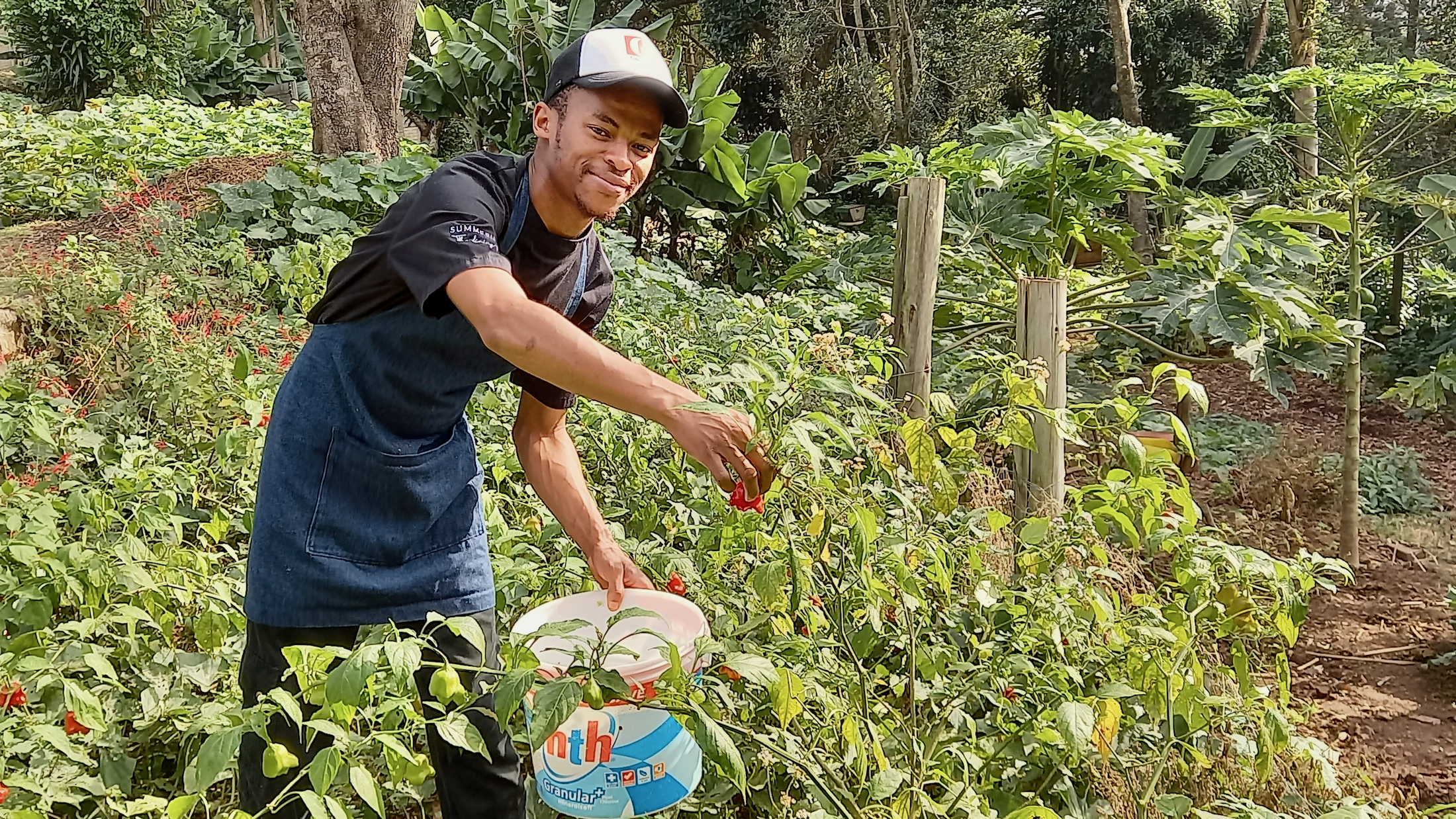
Thabiso Khumalo harvests the last of the bishop’s crown pepper crop to pickle. (Photo: Wanda Hennig)
“Today we’re going to have to pickle some peppers.” I spent the day with Richter before the current lockdown kicked in. They do all their own pickling. And fermenting, soy sauce included, this being made from dal and currently resting for the fourth month in six jumbo screw-top glass jars. “In a year’s time it will be at prime maturity,” says Richter.
We’ll do a peri-peri glaze (sourced from bishop’s crown peppers, like those Thabiso Khumalo will harvest in the veggie garden to pickle). I’d like to cover the (Midlands Blue Orange farm) duck liver mousse with an onion puree. It will give the sweetness. Then cover that with the peri-peri glaze.
“We want grainy chips. What alternative can we use for the teff? We’ve dried the rest of the sorghum. Maybe use that for the chips with the goat cheese.
“We’ll make mayo.” Both a peri-peri mayo and one with pureed (Kokstad) truffle.
Sweet, sour, salty, he says at some point, is his flavour template. Plus the pickle component. And texture. The crunch. And surprise, let me add. Although maybe that’s part of the sweet, sour, salty. When I get to taste the young-corn soup that’s been gently bubbling, with its shot of granadilla vinaigrette; plain and simply, it was “Wow!”
To discover Thabiso Khumalo in the kitchen with Richter was a happy delight. We’ve written about him in TGIFood as a foraging Africa chef (link through to read the story) who sees food as an expression of culture and communication.
When we spoke to Khumalo for that story, during earlier Covid-19, spurred by lockdown he was expanding his vision and practice around developing a refined Zulu cuisine using foraged and market-garden ingredients sourced for flavour, “which must come from nature, the earth and the preparation”. He was also, at the time, doing some collaborations with Richter.

Thabiso Khumalo adds smokiness to the pepper harvest to bottle and preserve. (Photo: Wanda Hennig)
“I would have been crazy to turn down the opportunity to work with him and learn from him,” Khumalo says when we play “I spy” for the last of the glowing red peppers he will slice, de-pip (keeping the seeds to dry and replant), subject to the blow-torch for smokiness then pickle with selected herbs, spices, salt and vinegar made in the kitchen from apples and pineapples.
Richter, he says, is doing “what my dream is to do with Zulu food”.
And what Richter is doing includes Zulu food. The smoked Zulu caramelised pumpkin cooked on the coals, for instance, on the evening’s menu with the (Cape Wagyu) beef (including a goulash of Wagyu cheek and tongue) and quince.
Nobody with a reservation has requested the vegetarian menu. Which is not to say vegetables don’t feature strongly. “It’s more that we do vegetables and add meat,” Richter says. Organic amazing vegetables, those not home-grown sourced from Farm to Forks at Monteseel, a half-hour drive away.

Akhona Dukwana preps espresso jellybeans. (Photo: Wanda Hennig)
There is a Belnori goat cheese starter on the evening’s menu, not from KZN but chosen for the quality of the cheese and the ethics of the farm. There’s a vegan calabash dish with roasted gem squash puree and chilli-lime coconut. Tamarind on something else. The crispy dry-aged chicken comes with roasted and glazed carrot and gooseberry plus parsnip puree and spekboom from the herb garden for a hint of “sour”.
He asks Akhona Dukwana, who trained at Mafikeng Hotel School and started in the kitchen as an intern two-and-a-half years ago, to start on the jellybeans. Two shots espresso (beans from Durban’s Bean Green, Ethiopian beans, the most-faraway product they use), cream to 400ml, 100g sugar, 6g Agar (a gelatine alternative).
Then there is the smoked kingfish, speared the previous day by Richter. To align with his ethical and sustainable values he will only put fish or crayfish on the menu if he has harvested it himself. On top of the fish is a “couscous” of raw cauliflower, freshly cracked raw macadamia, lime juice and olive oil. Intense truffle mayo, too. Somewhere, trout roe. Silky textures. And crunch.
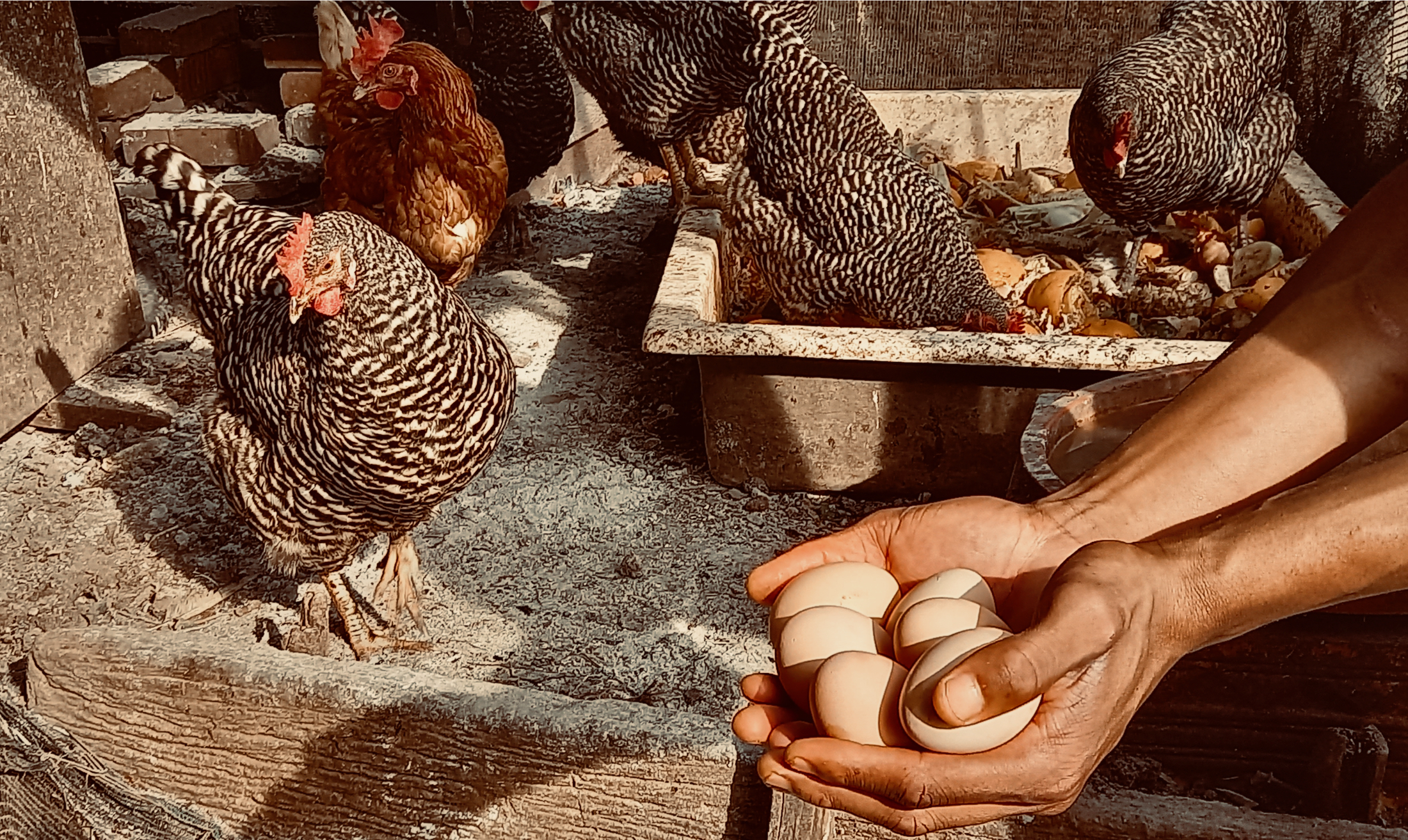
The day’s eggs with the chickens: part of the composting cycle. (Photo: Wanda Hennig)
The veggie garden has been trial and error and a learning process, he and Johanna admit. The potatoes, beets and much of what they put in early on turned out to be lessons in what not to plant for climate and the soil.
The chickens, a fairly recent addition, have helped with creative composting. The birds get first dibs at what comes out the kitchen, before it is dug into the compost heap. Then repurposed back in the soil.
Since they got the chicken, besides the value that all eggs now used now come from their hens, “we’ve been able to cut back on seven black bags at every garbage disposal cycle”, Johanna says with a note of triumph.
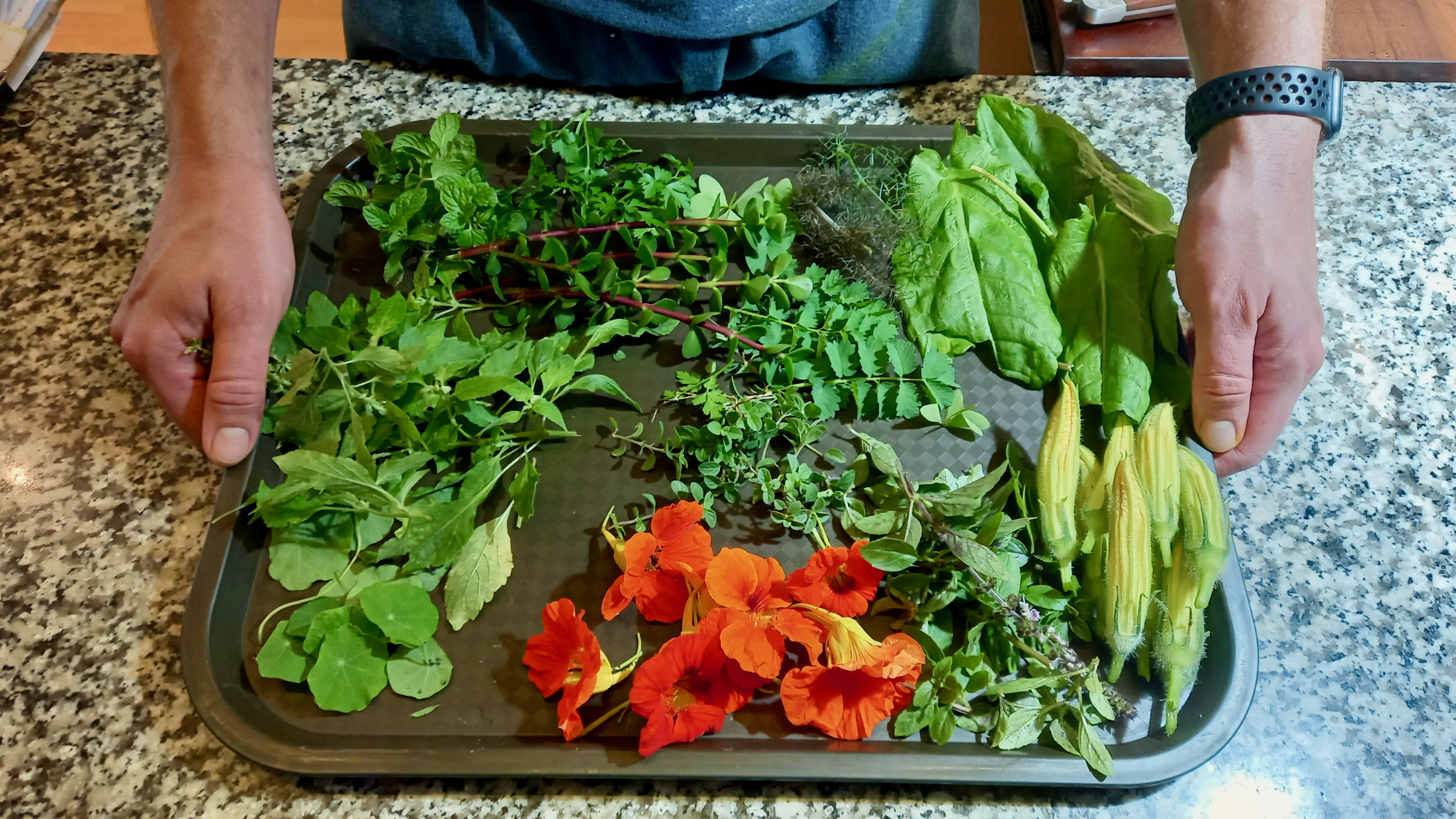
Herb garden medley. The pumpkin flowers, right, will be shredded for the Zulu pumpkin and beef dish. (Photo: Wanda Hennig)
The herb garden is a flourishing treasure trove of flavour. Pumpkin flowers to be shredded for texture, flavour and visual appeal. Sorrel. Mint. Parsley. Holy basil and Thai basil. Salad burnet. Oregano. Nasturtium leaves and flowers. Spekboom.
Somewhere on the property, once-upon-a-time, was a towering silky oak, an Australian native, waiting to be repurposed as a handsome LivingRoom supper club bar counter and serving platters during the spreading garden’s transition to indigenous.
I go on a drive with Richter to see ceramicist Louise Jennings who lives a few streets away. The wire and wood plates they use at The LivingRoom are from the African Art Centre. The crockery: “We’ve designed our own range of plates. Using KZN clay. Made by Louise.”
On the drive he shows me where he forages, on verges and along the conservancy area. For indigenous fruit and mushrooms. “On days I run after the rain, I scout for them. Then go back in the car, sometimes with the team, to harvest them.”
He plans to launch a vegan menu as a standard option soon. A plant-based food whizz will come from the Cape to work with the team on the menu.
Carnivores, be reassured. He also plans to introduce rabbits for meat production; to be farmed and humanely slaughtered on the property.
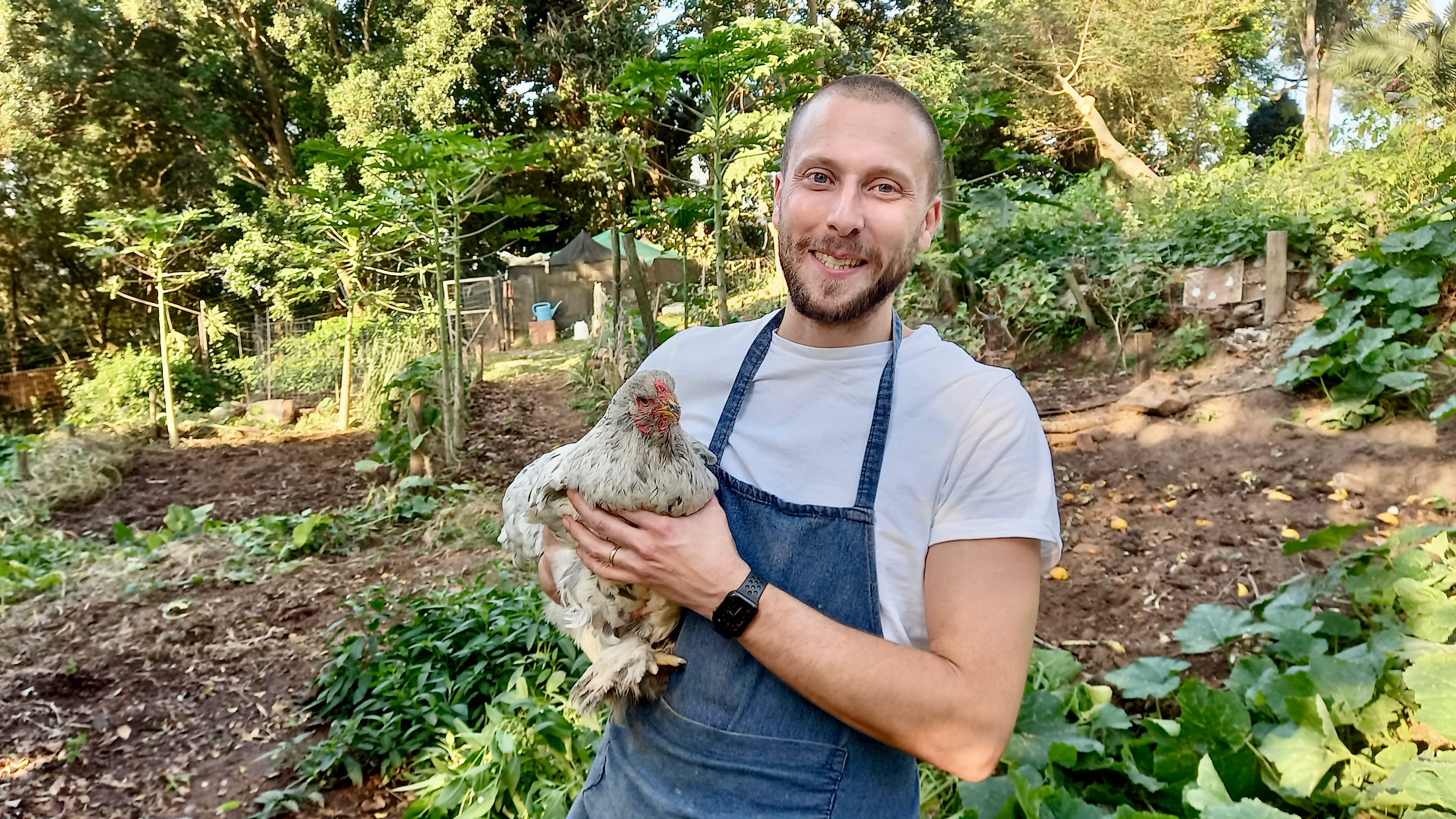
Johannes Richter with one of the eccentric layers in the veggie garden. (Photo: Wanda Hennig)
“I was lucky growing up. In the family, there was a focus on synergy around what we ate,” Richter says. His grandparents, who lived in Germany, had a smallholding in Hungary. “They had grapes and made wine. They made schnapps from the pears, plums and apples growing in the orchard. They had pigs and did their own charcuterie. My parents took us often to visit them and on many travels.”
He vividly remembers walking in a forest in Madagascar, peeling bark from a tree and smelling the cinnamon; being introduced there to the heady aroma and flavour of vanilla. Also, of unwinding after his high school days at Thomas More cooking in the kitchen at home. The same kitchen he spends his days in now.
The kitchen where the ambience is focused; mindful. Like a mantra, the most-said word by all three people working in it is “yebo”. Have you? Yebo! Will you? Yebo! Is it? Yebo.
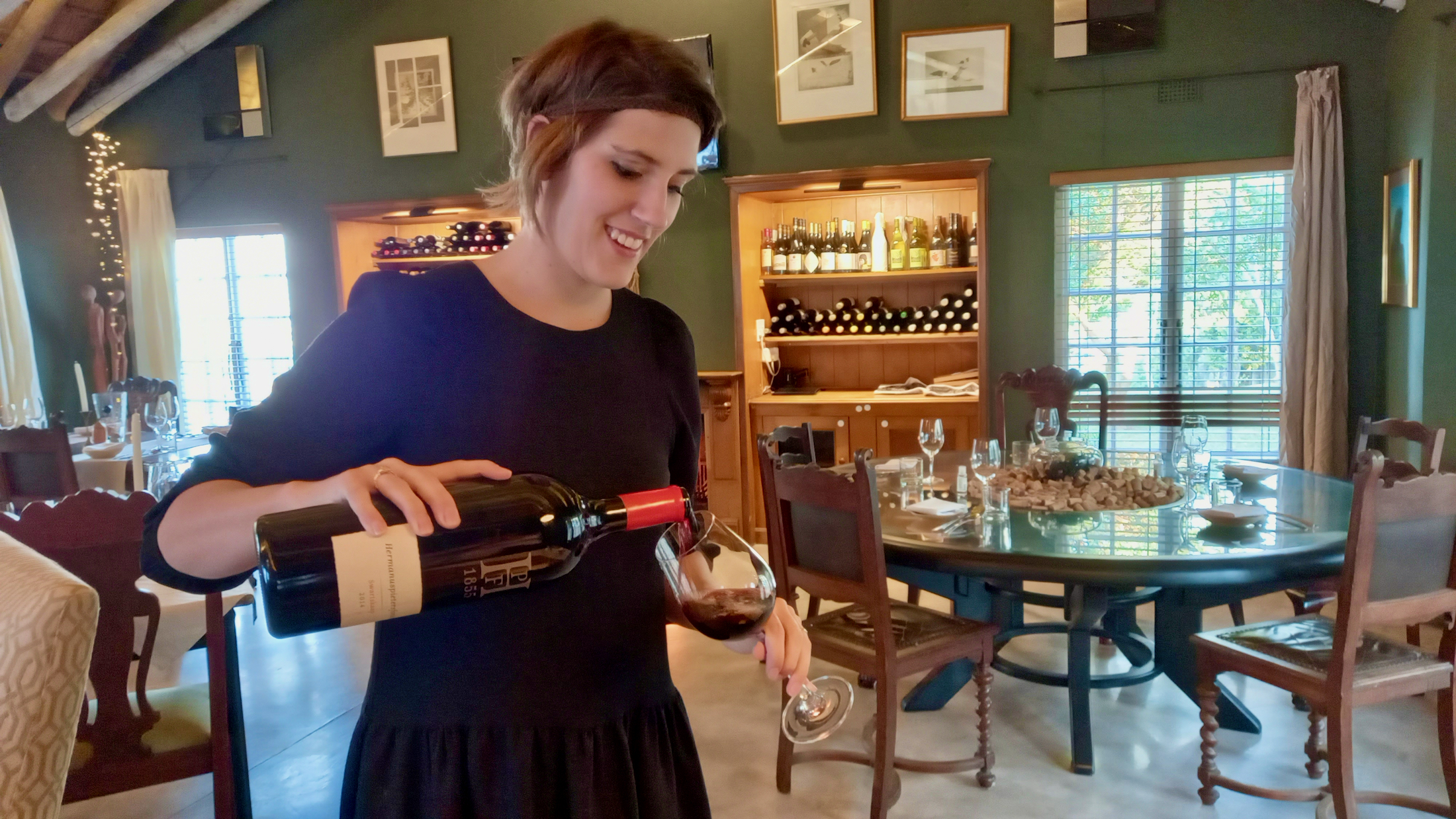
Johanna Richter’s wine list focus is small estates and pleasure. (Photo: Wanda Hennig)
Lovely, genial Johanna, who runs things front-of-house, is the in-house somm. “So much love and effort goes into the food and we do a lot of pairings. Part of the experience here is the wine so my focus when selecting is on small estates. Wines you won’t find in every bottle store. Boutique winemakers.”
And imperative, she says with her ready earthy giggle: “I have to enjoy them.”
Naturally, she says: “I’ve drunk the whole list.”
She has good credentials for the job. From Austria, she started working in hospitality “school jobs” at age 14, graduated later from hotel school, was mentored by a top Austrian sommelier and had hotel management and waitressing jobs in France and Spain before she got the fateful job waitressing in Berlin at the restaurant where she met Johannes.
It seems the perfect pairing, the Johannes/Johanna combination, way beyond wine or the providence of the matching names.
While there, I am invited to join the family at their dinner table, before guests arrive. At the table where family members gather each evening to eat together. Today there are Johannes and Johanna, their toddler son, baby daughter and the children’s carer, and Christine Richter, Johannes’s mom. It is she who established Summerhill Boutique Hotel in 1997, at Summerhill Estate, the family’s property – where Johannes grew up – in the Cowies Hill conservancy in Pinetown.
“I feel so fortunate,” she shares during the meal, “that I have this place my family wants to be. I get to love my grandchildren and they to love me.” And, she comments, she and Joanna get on so well, “which makes it all possible”.
The family table is in the corner of The LivingRoom, the supper club where diners – reservations are essential – will start arriving in about an hour. What was once the family’s living room, now shared. They seat a maximum of 20. This was the case even before Covid-19. Different now is that tables are more carefully spaced.
I have to laugh when Johannes tells me they are having currywürst for dinner. I know it as a fast-food German dish. Something I once wrote about in a story on quirky international fast-food preferences so thought I better try when in Berlin a couple of trips back. “I had probably the worst currywürst in Berlin at that, can’t recall the name, huge department store with a vast upstairs food court,” I tell Johannes.
“KaDeWe?” he guesses. Spot on. The sausage that time was, keeping things polite, unfortunate. The chips anaemic and rigid. An oh-no vision, when you see something and instantly lose your appetite knowing you’ve made a mistake.
But his mom, Johannes tells me, just bought back good German bratwurst from Cape Town. He fries it up. Slices potatoes into wedges, skin on, and drops them into the hot sunflower oil. They come out crispy and golden; ready for his toss of Oryx salt.
I am there on a Wednesday. “Generally speaking, on Sundays or holidays we have a roast or meat,” Johannes says when I ask. Because, don’t we always want to know what chefs eat?
And other times?
“I love to go to Glenwood Bakery sometimes for a pizza. Or out for a good curry. At home and most nights we stick to vegetables. Yesterday, a green salad and potato with herb butter. Sunday, beef olives. Saturday, a vegetable curry and rice. Friday, a ratatouille with pan-fried potatoes and a green salad…”
The key question: “Why don’t you eat the menu every night you offer guests?”
Earlier he’s said most people who book, fill the 20 seats, are there to celebrate an occasion or “they’re serious about food”.
“It would become sensory overload,” he answers, simply. Honestly. Which makes sense.
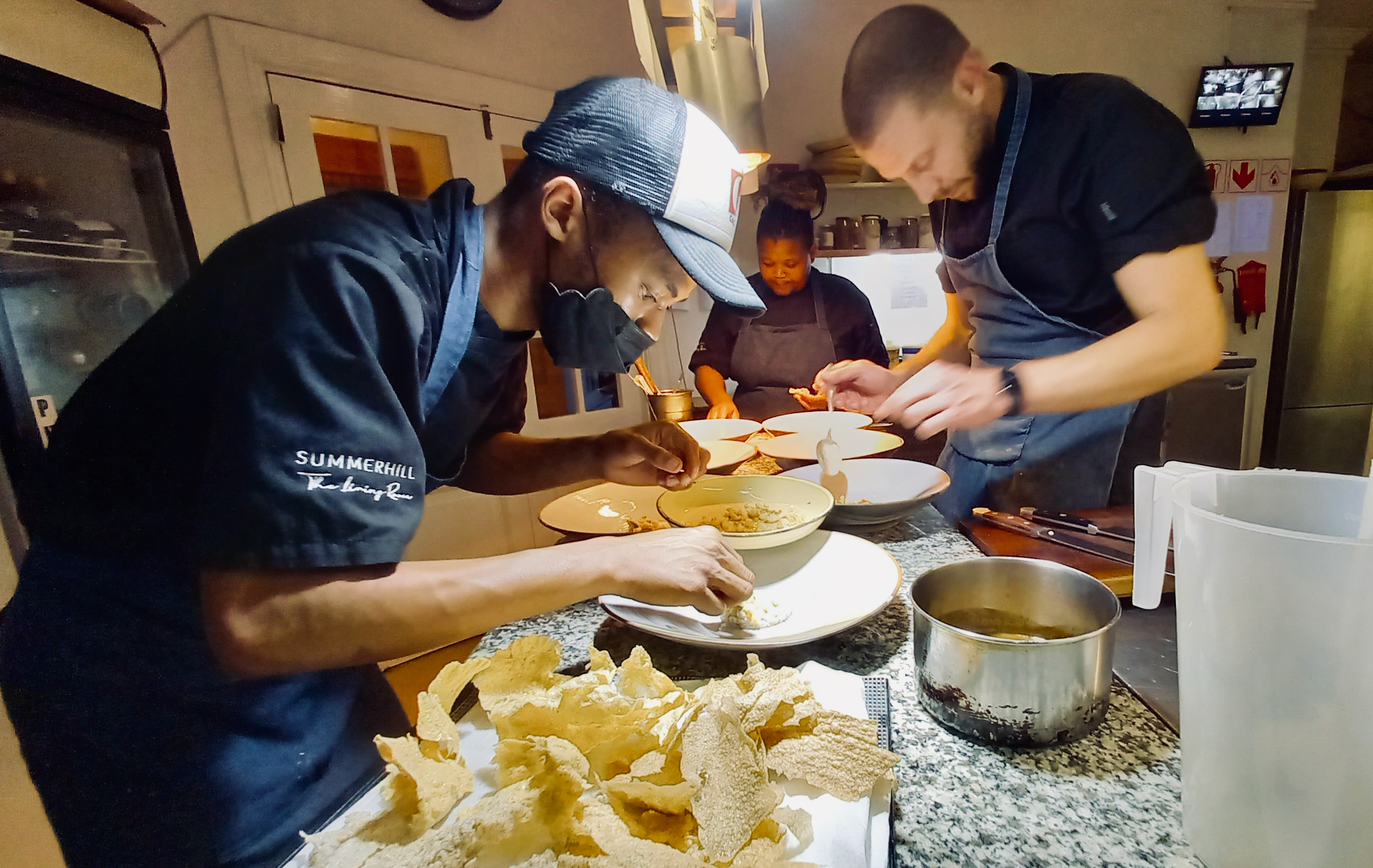
The team that preps and cooks together, plates together. (Photo: Wanda Hennig)
I ask him what he sees for The LivingRoom going forward.
“To stay ambitious, always get better and continue to serve great food. To stay true to our commitment, depicting and showcasing Durban’s bounty and culinary diversity. And to continue with our commitment to produce, ingredients, sustainability, with everything.”
One might think of the menu and the food, given the attention to detail and care, as highfalutin elitist. Richter’s view is the opposite. “We’re anti-snobbish. No caviar here. Clean, understated, no bullshit, minimalistic. Nothing on the plate is there for optics,” he says. And nothing to hide, given my welcome into his kitchen for the day.
“It seems to me that our three basic needs, for food and security and love, are so mixed and mingled and entwined that we cannot straightly think of one without the other.” And “If you are in a bad temper, you should not be thinking about food at all.”
Both these quotes are from the late MFK Fisher, an American writer I have long loved to read who believed eating well was one of the arts of life and who explored this in her writing.
Food. Security. Love. Clearly that trio has tremendous impact, as the LivingRoom has just shown in a win that they were as astonished as everyone else to receive. DM/TGIFood
This story was first published in TGIFood in July 2021.
Follow The LivingRoom at Summerhill Estate on Instagram and on Facebook.





Never read an article like this while hungry! Soon as the lockdown is over I am driving to Durbs to eat here, no question. Wonderful article ….. such a change from Zuma et al with which we are daily bombarded.
Great story. Why currywürst but bratwurst?
As I understand it and I googled to check this out while writing the piece, and again now, currywürst is the name of the “dish” and bratwurst is one of the sausages that can be used.